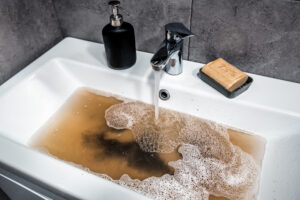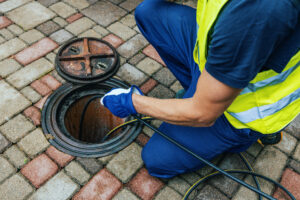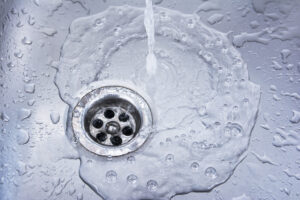Summer is a time for outdoor fun, cookouts, and family gatherings. While these activities bring joy and memories, they can also lead to an increase in drain clogs if you’re not careful. From food scraps to grease and other debris, summer activities can take a toll on your plumbing. Here are some tips for preventing and clearing clogged drains so you can enjoy your summer without the hassle of plumbing issues.
What Could Cause Drain Clogs?
Cookouts and BBQs
Summer is synonymous with grilling and outdoor cooking, which often involves a lot of grease, food scraps, and debris. Rinsing these substances down the sink after cleaning up can cause them to accumulate inside pipes. Over time, grease solidifies and food particles clump together, forming stubborn clogs that restrict water flow and lead to backups in sinks and drains.
Garden Activities
Activities like gardening and lawn care introduce dirt, mud, and plant matter into outdoor drains. When people wash garden tools or hands in sinks, they can inadvertently introduce soil particles and debris into indoor plumbing systems. This debris can accumulate over time, especially if not flushed away properly, leading to blockages in drains and pipes.
Pool Parties
Poolside fun brings its share of debris such as sand, leaves, and grass clippings into contact with outdoor drains. As people wash or sweep away these materials, they can accumulate in drain openings, causing blockages that hinder proper drainage and potentially lead to water pooling around the pool area.
Increased Usage
During summer, households often experience increased use of showers, sinks, and toilets. With kids out of school and more family members at home, the plumbing system handles greater volumes of water and waste. This increased usage can strain pipes and drains, making them more susceptible to clogs from hair, soap scum, and other debris that accumulate over time.
Tips for Preventing Clogged Drains
Proper Grease Disposal to Prevent Drain Clogs
To maintain a healthy plumbing system, it’s crucial to adopt simple yet effective practices. One of the most important steps is to avoid pouring grease down the drain. After cooking, allowing grease to cool and solidify before scraping it into a disposable container ensures that it doesn’t clog pipes over time. This not only prevents blockages but also reduces the risk of costly repairs. Additionally, installing a grease trap in your kitchen sink can significantly help manage grease disposal. Grease traps intercept fats, oils, and grease before they enter your pipes, preventing them from accumulating and causing drainage issues.
Mind Food Scraps
One effective proactive measure that prevents clogs and maintains hygiene is to use a sink strainer, which acts as a barrier against food particles and debris from entering your plumbing system. By placing a strainer in the sink drain, you can easily collect solid waste such as vegetable peels and leftover food scraps. It’s essential to empty the strainer into the trash regularly to prevent buildup that could potentially lead to blockages.
 In addition to using a sink strainer, composting food waste offers another eco-friendly solution to reduce debris in your drains. By composting vegetable peels, fruit scraps, and other organic materials, you divert these items from your garbage disposal or sink altogether. This not only lessens the load on your plumbing, but also contributes to sustainable practices by creating nutrient-rich compost for gardening or landscaping.
In addition to using a sink strainer, composting food waste offers another eco-friendly solution to reduce debris in your drains. By composting vegetable peels, fruit scraps, and other organic materials, you divert these items from your garbage disposal or sink altogether. This not only lessens the load on your plumbing, but also contributes to sustainable practices by creating nutrient-rich compost for gardening or landscaping.
Be Careful with Outdoor Drain Clogs
Another effective way to protect outdoor drains is by using drain covers or grates. These devices act as barriers, preventing leaves, dirt, and other debris from entering and potentially clogging the drains during heavy rains or seasonal changes. By installing these covers, you can significantly reduce the amount of maintenance required and minimize the risk of blockages.
Regular cleaning of outdoor drains is equally important in ensuring their proper function. Periodically inspecting and cleaning the drains allows you to remove any accumulated debris that could obstruct water flow. This proactive approach not only prevents blockages but also extends the lifespan of your drainage system, reducing the likelihood of costly repairs or replacements.
Manage Bathroom Usage
Using hair catchers in shower and bathtub drains effectively trap hair and prevent it from accumulating in the pipes, where it can combine with soap scum and other debris to create stubborn blockages over time. Regularly cleaning out the hair catchers and disposing of the collected hair in the trash helps to maintain efficient drainage and reduce the need for plumbing interventions.
 Equally important is being mindful of what gets flushed down the toilet. It’s essential to adhere strictly to flushing only toilet paper and human waste. Items such as wipes, feminine hygiene products, cotton balls, and other non-flushable materials should never be flushed. These items do not break down like toilet paper and can easily cause blockages in both household plumbing and municipal sewer systems. By disposing of non-flushables in the trash, you not only protect your plumbing from potential damage but also contribute to the proper functioning of the wastewater treatment infrastructure.
Equally important is being mindful of what gets flushed down the toilet. It’s essential to adhere strictly to flushing only toilet paper and human waste. Items such as wipes, feminine hygiene products, cotton balls, and other non-flushable materials should never be flushed. These items do not break down like toilet paper and can easily cause blockages in both household plumbing and municipal sewer systems. By disposing of non-flushables in the trash, you not only protect your plumbing from potential damage but also contribute to the proper functioning of the wastewater treatment infrastructure.
Summer activities should bring enjoyment, not be disrupted by plumbing issues. By being mindful of what goes down your drains and following these preventive tips, you can avoid clogs and keep your plumbing system running smoothly. In the event of a clog, go to our home page or Contact Fite Plumbing, Heating & Cooling today to schedule a professional inspection and ensure your home stays clean, comfortable, and energy-efficient in your absence.

